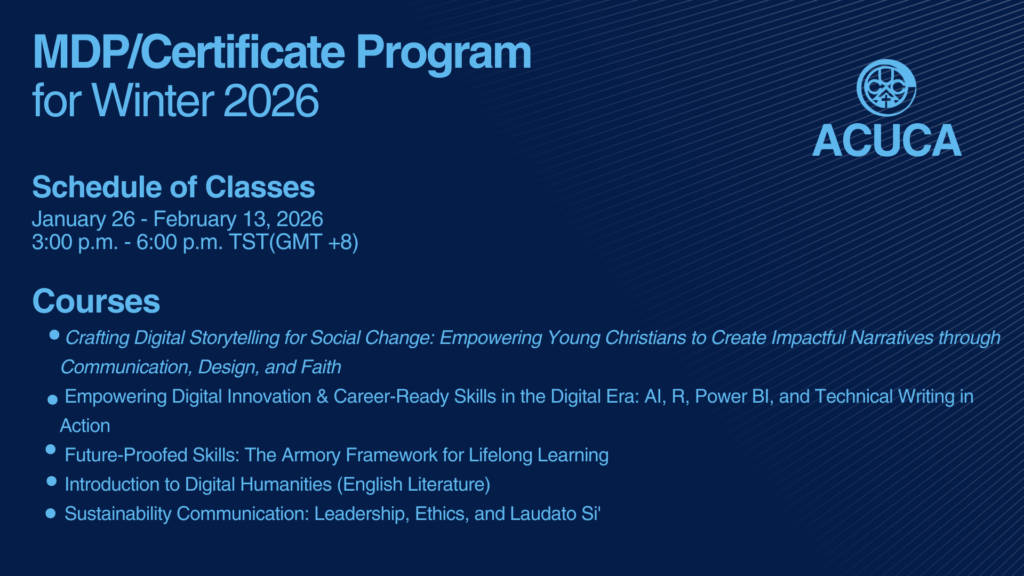
- About
- Crafting Digital Storytelling for Social Change: Empowering Young Christians to Create Impactful Narratives through Communication, Design, and Faith
- Empowering Digital Innovation & Career-Ready Skills in the Digital Era: AI, R, Power BI, and Technical Writing in Action
- Future-Proofed Skills: The Armory Framework for Lifelong Learning
- Introduction to Digital Humanities (English Literature)
- Sustainability Communication: Leadership, Ethics, and Laudato Si’
The radical transformation from a traditional face-to-face classroom setting to an exclusive online learning environment substantially affected the educational systems of many countries during the pandemic by Covid-19. The inherent challenges necessitate the implementation of efficient and effective methods of delivering online distance learning to preserve classroom equilibrium, resulting in the acceptance of this form of instruction as a proven and effective alternative.
The ACUCA Micro Degree Program (MDP) was created in the summer of 2022 with unanimous approval from the Executive Committee (EXCO) to fulfill the three main objectives outlined in the existing ACUCA Constitution and By-Laws at that time of the program’s inception and implementation: to develop and maintain Christian character; to enrich the quality of their educational programs and those of the other institutions of learning; and to re-examine the relevance of their objectives and programs concerning the needs of a changing society. Two additional objectives were incorporated into the program’s rationale: to offer students from member institutions supplementary education that is not available at their home colleges or universities, and to provide credentials to enhance employability. The MDP was also created to provide a platform for the faculty members to collaborate on creating specific micro degrees to be offered in the program.
At the end of the program, the students were awarded with Micro Degree Certificate of a particular field of concentration within the specified period and have been able to complete all the requisite courses, normally two. Otherwise, a completion certificate if only one course has been complied with.
Crafting Digital Storytelling for Social Change: Empowering Young Christians to Create Impactful Narratives through Communication, Design, and Faith
Dr. Inri Inggrit Indrayani
Maria Nala Damajanti, S.Sn, M. Hum.
Mega Ekklesia Putrihadi, S. Sn, M.M.
(Petra Christian University)
This course analyzes how storytelling, inspired by Christian values and informed by creative design, can function as a catalyst for positive social transformation.
Empowering Digital Innovation & Career-Ready Skills in the Digital Era: AI, R, Power BI, and Technical Writing in Action
Dr. SANDHIYA S
(Women’s Christian College)
This intensive course equips students with career-ready digital skills, combining AI, R Analytics, Power BI, and professional technical writing. Through hands-on projects, participants will analyze complex datasets, create interactive dashboards, and produce professional-quality reports that translate insights into actionable solutions.
Future-Proofed Skills: The Armory Framework for Lifelong Learning
Assoc. Prof. Ian R. Lana
(Trinity University of Asia)
The course uses the powerful metaphor of the Armor of God in Ephesians 6:10-18 as a strategic framework, where each piece represents a critical discipline or mindset required to build a resilient professional skill set in the modern era. The course is designed to help college students strengthen their lifelong learning mindset and discover practical ways to stay adaptable, resilient, and purpose-driven in a rapidly changing world.
Introduction to Digital Humanities (English Literature)
Dr. Phebe Angus G.
(Madras Christian College)
Introduction to Digital Humanities (English Literature) is where literature meets technology. From The Iliad to Harry Potter, from Shakespeare to Chimamanda Ngozi Adichie, this course shows how stories across centuries can be decoded using data. You’ll learn to mine text, visualize emotions, and uncover hidden patterns in words using tools like Python, Tableau, and Voyant. It’s a hands-on, creative space for digital explorers who want to read beyond the page—combining code, culture, and curiosity to tell new stories from old texts.
Sustainability Communication: Leadership, Ethics, and Laudato Si’
Prof. Dr. Dorien Kartikawangi
(Atma Jaya Catholic University)
This course examines how communication shapes our understanding of sustainability and environmental stewardship, grounded in ethical reflection and inspired by the moral vision of Laudato Si’. It focuses on how leaders, organizations, and communities communicate about the environment—not only about climate, but also about biodiversity, waste, urban ecology, resource use, and community well-being.
